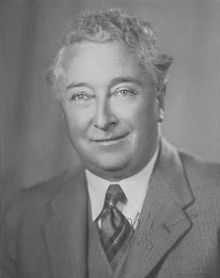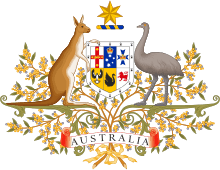Australian federal election, 1931
Australian federal election, 1931

|
|
|
|
|
|
Federal elections were held in Australia on 19 December 1931. All 75 seats in the House of Representatives, and 18 of the 36 seats in the Senate were up for election. The incumbent Australian Labor Party led by Prime Minister of Australia James Scullin was defeated by the newly formed opposition United Australia Party (descended from the Nationalist Party of Australia) led by ex-Labor Joseph Lyons. The UAP fought the election in the traditional non-Labor Coalition with the Country Party, led by Earle Page, but won enough seats to form an exclusively UAP government.
Results
House of Reps (IRV) — 1931–34—Turnout 95.04% (CV) — Informal 3.48%
| |
Party |
Votes |
% |
Swing |
Seats |
Change |
| |
United Australia Party |
1,145,083 |
36.10 |
+2.20 |
34 |
+20 |
(1 elected
unopposed) |
| |
Australian Labor Party |
859,513 |
27.10 |
−21.74 |
14 |
−32 |
| |
Country Party |
388,544 |
12.25 |
+1.98 |
16 |
+6 |
(3 elected
unopposed) |
| |
Australian Labor Party (NSW) |
335,309 |
10.57 |
* |
4 |
+4 |
| |
Emergency Committee (SA) |
174,288 |
5.49 |
* |
6 |
+6 |
| |
Independents |
260,786 |
8.22 |
+6.09 |
1 |
−3 |
| |
Other |
8,511 |
0.27 |
|
0 |
−1 |
| |
Total |
3,172,034 |
|
|
75 |
|
| |
UAP/Country coalition |
WIN |
|
|
50 |
+26 |
| |
Australian Labor Party |
|
|
|
14 |
−32 |
Independent: Littleton Groom (Darling Downs, Qld)
Seats changing hands
| Seat |
Pre-1931 |
Swing |
Post-1931 |
| Party |
Member |
Margin |
Margin |
Member |
Party |
| Adelaide, SA |
|
Labor |
Edwin Yates |
11.4 |
21.0 |
9.6 |
Fred Stacey |
Emergency Committee |
|
| Angas, SA |
|
Labor |
Moses Gabb |
4.7 |
31.5 |
26.8 |
Moses Gabb |
Emergency Committee |
|
| Ballaarat, Vic |
|
Labor |
Charles McGrath |
7.4 |
20.7 |
13.3 |
Charles McGrath |
United Australia |
|
| Barton, NSW |
|
Labor |
James Tully |
17.6 |
20.8 |
3.2 |
Albert Lane |
United Australia |
|
| Bass, Tas |
|
Labor |
Allan Guy |
10.4 |
24.9 |
14.5 |
Allan Guy |
United Australia |
|
| Batman, Vic |
|
Labor |
Frank Brennan |
25.8 |
26.6 |
0.8 |
Samuel Dennis |
United Australia |
|
| Bendigo, Vic |
|
Labor |
Richard Keane |
5.1 |
14.6 |
9.5 |
Eric Harrison |
United Australia |
|
| Boothby, SA |
|
Labor |
John Price |
5.6 |
29.6 |
24.0 |
John Price |
Emergency Committee |
|
| Brisbane, Qld |
|
United Australia |
Donald Charles Cameron |
2.4 |
3.1 |
0.7 |
George Lawson |
Labor |
|
| Calare, NSW |
|
Labor |
George Gibbons |
1.6 |
11.7 |
10.1 |
Harold Thorby |
Country |
|
| Corangamite, Vic |
|
Labor |
Richard Crouch |
2.1 |
15.0 |
12.9 |
William Gibson |
Country |
|
| Corio, Vic |
|
Labor |
Arthur Lewis |
6.0 |
16.6 |
10.6 |
Richard Casey |
United Australia |
|
| Dalley, NSW |
|
Labor |
Ted Theodore |
N/A |
8.9 |
14.0 |
Sol Rosevear |
Labor (NSW) |
|
| Darling Downs, Qld |
|
United Australia |
Arthur Morgan |
N/A |
17.7 |
9.8 |
Littleton Groom |
Independent |
|
| Denison, Tas |
|
Labor |
Charles Culley |
9.2 |
14.2 |
5.0 |
Arthur Hutchin |
United Australia |
|
| East Sydney, NSW |
|
Labor (NSW) |
Eddie Ward |
5.7 |
11.7 |
1.7 |
John Clasby |
United Australia |
|
| Eden-Monaro, NSW |
|
Labor |
John Cusack |
0.1 |
13.7 |
13.6 |
John Perkins |
United Australia |
|
| Fawkner, Vic |
|
Independent Nationalist |
George Maxwell |
N/A |
21.7 |
20.3 |
George Maxwell |
United Australia |
|
| Flinders, Vic |
|
Labor |
Jack Holloway |
0.2 |
18.5 |
18.3 |
Stanley Bruce |
United Australia |
|
| Franklin, Tas |
|
Labor |
Charles Frost |
1.9 |
13.0 |
17.9 |
Archibald Blacklow |
United Australia |
|
| Fremantle, WA |
|
Labor |
John Curtin |
7.0 |
13.5 |
5.5 |
William Watson |
United Australia |
|
| Grey, SA |
|
Labor |
Andrew Lacey |
9.6 |
17.1 |
7.5 |
Philip McBride |
Emergency Committee |
|
| Gwydir, NSW |
|
Labor |
Lou Cunningham |
3.7 |
13.5 |
9.8 |
Aubrey Abbott |
Country |
|
| Hume, NSW |
|
Labor |
Parker Moloney |
6.6 |
14.1 |
7.5 |
Thomas Collins |
Country |
|
| Hunter, NSW |
|
Labor |
Rowley James |
100.0 |
57.2 |
7.2 |
Rowley James |
Labor (NSW) |
|
| Indi, Vic |
|
Labor |
Paul Jones |
1.4 |
14.4 |
13.0 |
William Hutchinson |
United Australia |
|
| Lang, NSW |
|
Labor |
William Long |
16.2 |
20.4 |
4.2 |
Dick Dein |
United Australia |
|
| Macquarie, NSW |
|
Labor |
Ben Chifley |
15.6 |
16.2 |
0.6 |
John Lawson |
United Australia |
|
| Maribyrnong, Vic |
|
Labor |
James Fenton |
23.2 |
23.6 |
0.4 |
James Fenton |
United Australia |
|
| Martin, NSW |
|
Labor |
John Eldridge |
6.4 |
22.7 |
16.3 |
William Holman |
United Australia |
|
| North Sydney, NSW |
|
Independent Nationalist |
Billy Hughes |
16.1 |
23.6 |
7.5 |
Billy Hughes |
United Australia |
|
| Oxley, Qld |
|
United Australia |
James Bayley |
0.1 |
5.9 |
5.8 |
Francis Baker |
Labor |
|
| Parramatta, NSW |
|
Labor |
Albert Rowe |
3.3 |
19.5 |
16.2 |
Frederick Stewart |
United Australia |
|
| Reid, NSW |
|
Labor |
Percy Coleman |
N/A |
55.3 |
5.3 |
Joe Gander |
Labor (NSW) |
|
| South Sydney, NSW |
|
Labor |
Edward Riley |
16.3 |
21.4 |
5.1 |
John Jennings |
United Australia |
|
| Wannon, Vic |
|
Labor |
John McNeill |
2.0 |
14.3 |
12.3 |
Thomas Scholfield |
United Australia |
|
| Wentworth, NSW |
|
Independent Nationalist |
Walter Marks |
8.3 |
58.3 |
15.8 |
Eric Harrison |
United Australia |
|
| Werriwa, NSW |
|
Labor |
Bert Lazzarini |
15.4 |
17.1 |
1.7 |
Walter McNicoll |
Country |
|
| West Sydney, NSW |
|
Labor |
Jack Beasley |
36.5 |
11.4 |
15.1 |
Jack Beasley |
Labor (NSW) |
|
| Wimmera, Vic |
|
Country Progressive |
Percy Stewart |
N/A |
21.8 |
11.8 |
Hugh McClelland |
Country |
|
| Wilmot, Tas |
|
Labor |
Joseph Lyons |
2.9 |
25.0 |
22.1 |
Joseph Lyons |
United Australia |
|
|
- Members in italics did not contest their seat at this election.
Issues
The election was dominated by the Great Depression in Australia, which was at its height. As the Labor Government had come to office two days before the Wall Street Crash of 1929, it was seen as being responsible for many of the economic and social problems Australia faced. Lang Labor also split from the Labor Party. The result was Labor's primary vote dropping to its lowest level since 1901. The two Labor factions won only 18 seats between them.
See also
Notes
References
|
|---|
| | Federal elections | |
|---|
| | Referendums | |
|---|
|
- Elections in: Australian Capital Territory
- New South Wales
- Northern Territory
- Queensland
- South Australia
- Tasmania
- Victoria
- Western Australia
|
|


